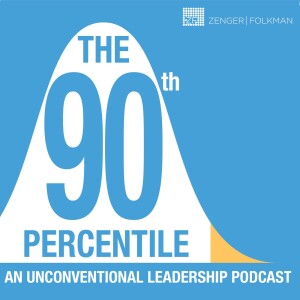
The 90th Percentile: An Unconventional Leadership Podcast
Business:Management

Episode 142: Trust and Resolving Conflict in the Workplace—Key Behaviors for Leaders
 2024-09-11
2024-09-11
Recently, a compelling question emerged: How do trust and conflict resolution impact a leader’s effectiveness? To explore this, we analyzed a robust dataset of 360-degree assessments from 4,347 leaders, collected over the past three years. In environments where leaders are untrustworthy or avoid resolving conflicts, dissatisfaction and disengagement flourish. Conversely, trusted leaders who adeptly navigate conflicts foster high levels of employee engagement and effectiveness. Today, we’ll dive deeper into the data, exploring how trust and conflict resolution enhance leadership, and reveal four key behaviors that help build these essential skills.
- Trust and Conflict Resolution are Interconnected: Leaders who excel in both trust-building and conflict resolution have significantly higher effectiveness, with effectiveness scores rising from the 17th percentile to the 77th percentile for those who master both skills. This demonstrates the critical role these behaviors play in leadership success.
- Active Leadership in Conflict Resolution is Essential: Leaders who avoid intervening in conflicts risk damaging employee engagement and productivity. Many conflicts require a third party to mediate and assist, as employees may not always have the skills or motivation to resolve conflicts themselves.
- High Trust and Conflict Resolution Improve Engagement: Leaders who are trusted and adept at resolving conflicts foster higher levels of employee engagement. Teams led by such leaders demonstrate greater engagement and commitment, resulting in better overall performance.
- Four Key Behaviors Enhance Conflict Resolution: The four essential behaviors identified are: staying in touch with team issues, encouraging cooperation, balancing concern for others with achieving results, and adapting to both the people and the situation. Mastering these behaviors helps leaders navigate conflicts more effectively while maintaining trust.
- Effective Leaders View Trust and Conflict Resolution as Core Skills: Trust-building and conflict resolution are not optional skills for leaders but essential components of their leadership strategy. Leaders who embrace these skills create a work environment where employees feel valued, heard, and motivated to perform their best.
Connect with Joe Folkman
Zenger Folkman hosts an exclusive live webinar every month, where you can meet Jack Zenger and Joe Folkman and talk about their latest leadership development research. Find out more information and register here.
ResearchResolving Conflicts in the Workplace: Key Behaviors for Leaders— Article by Joe Folkman and Jack Zenger
The post Episode 142: Trust and Resolving Conflict in the Workplace—Key Behaviors for Leaders first appeared on ZENGER FOLKMAN.
More Episodes
 2024-04-24
2024-04-24
Create your
podcast in
minutes
- Full-featured podcast site
- Unlimited storage and bandwidth
- Comprehensive podcast stats
- Distribute to Apple Podcasts, Spotify, and more
- Make money with your podcast
It is Free
- Privacy Policy
- Cookie Policy
- Terms of Use
- Consent Preferences
- Copyright © 2015-2024 Podbean.com




